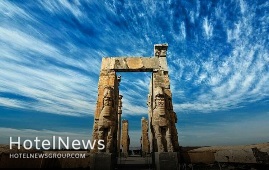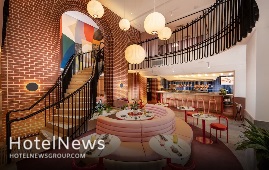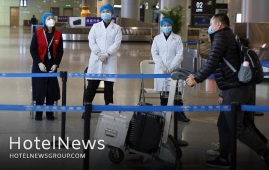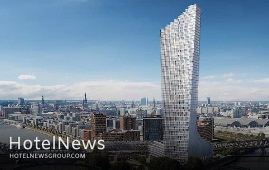
SALA Hospitality Group, Thailand’s homegrown design-led hospitality company, has unveiled the latest addition to its curated collection of beachfront resorts and boutique hotels: sala bang pa-in, a chic and stylish new riverside retreat that allows guests to escape the city, unwind in nature and learn about Thai history. With a fleet of boats awaiting to transport guests on immersive excursions, including complimentary transfers to and from the Summer Palace, every traveller can uncover the rich heritage of a charming yet relatively undiscovered part of the Kingdom. Scheduled to open its doors on 1st May 2021, sala bang pa-in will become the group’s ninth property in Thailand and the fifth member of sala boutique, a portfolio of intimate hotels situated in picturesque locations, many of which are filled with historical significance. Nestled on an island in the Chao Phraya River between Ayutthaya and Bangkok, Thailand’s ancient and modern capitals, Bang Pa-in is an exceptional addition to this anthology. This also marks the latest collaboration between SALA Hospitality Group and Twitee Vajrabhaya Teparkum from the Department of Architecture Co., the acclaimed Bangkok-based design studio, following the successful openings of Six Senses Samui and SALA Phuket Mai Khao Beach Resort. In the era of the Ayutthaya Kingdom, it is said that King Ekathosarot (reign from 1605 to 1620) was shipwrecked on an island in the Chao Phraya, Thailand’s “River of Kings”, as he sailed to the royal palace. There he met a woman living on the island and fell in love. Their alleged son, King Prasat Thong (reign from 1629 or 1630 to 1656) decided to build a palace in Bang Pa-in, as a tribute to the home of his mother[1]. Today, this “Summer Palace” remains an enchanting attraction that echoes the elegance of a bygone era, and guests at sala bang pa-in will be able to discover its secrets with complimentary daily boat services. Celebrating this destination’s vivid backstory and natural beauty, sala bang pa-in is a contemporary boutique retreat that puts guests on the doorstep of the Summer Palace. The hotel houses just 24 deluxe rooms and pool villas, all of which reflect a modern minimalist design concept and cutting-edge technology, such as high-end sound systems with smartphone connectivity, LED TVs and Espresso machines in every villa. Each spa-inspired bathroom comprises a separate bathtub and rain shower, and all 10 villas open out onto expansive riverside terraces with daybeds and private pools. The top room category, the spectacular three-bedroom river view presidential pool villa, offers 484 square metres of indoor and alfresco living space, making it ideal for families and groups of friends. Endless days can be spent exploring this intriguing area aboard the hotel’s own handcrafted 40ft wooden motorboat built by a renowned local boat builder in Ayutthaya, which offers river cruises to the Summer Palace (included in the room rate), along with daily sightseeing tours and sunset cocktail cruises. Alternatively, a luxurious 26ft speedboat is available for half- and full-day private charters and intimate group events. Bang Pa-in is an enticing option for visitors who want to embrace the great outdoors, with plenty of scenic cycling routes to and from the hotel, including a 50km loop that encompasses Ayutthaya and the Summer Palace, and secure bike parking at the hotel. Guests can also jog along a path that winds around the property and along the riverbank, relax with in-room spa and massage services, or plunge into the inviting outdoor swimming pool, which stretches 30 metres along the waterfront. Delectable dining experiences can be enjoyed at sala bang pa-in eatery and bar, its riverside restaurant. The menu of Thai and international cuisine highlights ingredients grown in the hotel’s onsite garden, accompanied by global wines, craft beers and creative cocktails. Indoor and outdoor seating is available with panoramic vistas. Within a short driving distance of Bangkok, sala bang pa-in is also an outstanding destination for out-of-town events, weddings and company away days. The 2nd floor multi-purpose meeting room, with its balcony and floor-to-ceiling glass doors, can host inspiring gatherings of up to 20 delegates, the 240sqm river-facing lawn is ideal for weddings, and the entire property can be reserved for unforgettable social or corporate occasions. sala bang pa-in will be led by Mr. Volkert Geertsen, a highly respected international hotelier and Cluster General Manager for sala boutique. The Chao Phraya is a legendary river that weaves timeless tales of Thailand’s past as it winds through the landscape. Now for the first time, curious explorers can discover the fables and folklore of Bang Pa-in, the home of the Summer Palace, while staying in a boutique hotel that delivers world-class experiences for couples, families and groups alike. Just a short distance from Bangkok, yet surrounded by unspoiled scenery, this is a captivating destination for urbanites who want to escape the city and unwind in peace and tranquility. We look forward to welcoming guests to sala bang pa-in, demonstrating our trademark sense of style and showcasing the grace and grandeur of Old Siam,” Mr. Geertsen commented. sala bang pa-in joins sala rattanakosin Bangkok, sala lanna Chiang Mai, sala ayutthaya and sala khaoyai in the sala boutique portfolio. Like all its sister hotels, it infuses the genuine warmth of Thai hospitality with a focus on authentic art, design and culinary creativity. And of course, guests can rest assured that their health and hygiene is SALA Hospitality Group’s top priority. Every property adheres to the SALA Safe programme, which ensures the safety of customers whilst preserving the core guest experience. The full list of measures can be found on the SALA Hospitality Group website. sala bang pa-in is located just 60km north of downtown Bangkok, 28km from the UNESCO World Heritage-listed Ayutthaya Historical Park, 41km from Don Mueang International Airport and 74km from Suvarnabhumi International Airport, making it ideal for domestic and international visitors alike.
Create: Mar 6, 2021 Edit: Mar 6, 2021 International News
An archaeological discovery lately been made in the vicinity of Persepolis has shed new light on the once ceremonial capital of the Achaemenid empire. Excavations and surveys on Tall-e-Ajori, which is situated in the surrounding areas of the UNESCO-registered Persepolis, are expected to help archaeologists uncover more about the history of the royal city. Regarding the significance of such excavations around Persepolis, the director of the World Heritage site on Wednesday noted: “[Some] half of the ancient world was led and managed from the Persepolis.” There is ample evidence for the claim, which could be found across the Marvdasht plain, which is also home to the UNESCO-registered Pasargadae, and several historical sites as well as villages and small towns scattered in an area of 85,000 hectares around Persepolis, Hamid Fadaei added. However, protecting and preserving such a vast area would be a challenging and time-consuming task, he explained. The official also noted that besides the archeological significance, the ecosystem and natural resources, and capacities of the area should be taken into consideration. Supervised by a joint mission of Iranian and Italian archaeologists and cultural heritage experts, the excavations on Tall-e-Ajori uncovered vestiges of a massive gateway measuring 30 by 40 meters with a height of approximately 12 meters. The archaeologists succeeded in proving that Cyrus had ordered the construction of the gateway near Persepolis in Tall-e-Ajori and that this magnificent gateway had been put into operation during the reign of his son Cambyses. “The building had a corridor in the center, which was in form of a rectangular room measuring eight by twelve meters, and inside this central room, there were four living chairs. And the central corridor opened on both sides to the Achaemenid campus,” according to Alireza Askari-Charoudi who is a senior Iranian archaeologist. The royal city of Persepolis ranks among the archaeological sites which have no equivalent, considering its unique architecture, urban planning, construction technology, and art. Persepolis, also known as Takht-e Jamshid, whose magnificent ruins rest at the foot of Kuh-e Rahmat (Mountain of Mercy) is situated 60 kilometers northeast of the city of Shiraz in Fars province. The city was burnt by Alexander the Great in 330 BC apparently as revenge to the Persians because it seems the Persian King Xerxes had burnt the Greek City of Athens around 150 years earlier. The city’s immense terrace was begun about 518 BC by Darius the Great, the Achaemenid Empire’s king. On this terrace, successive kings erected a series of architecturally stunning palatial buildings, among them the massive Apadana palace and the Throne Hall (“Hundred-Column Hall”). This 13-ha ensemble of majestic approaches, monumental stairways, throne rooms (Apadana), reception rooms, and dependencies is classified among the world’s greatest archaeological sites. Persepolis was the seat of the government of the Achaemenid Empire, though it was designed primarily to be a showplace and spectacular center for the receptions and festivals of the kings and their empire. The site is marked by a large terrace with its east side abutting the Kuh-e Rahmat (“Mount of Mercy”). The other three sides are formed by a retaining wall, varying in height with the slope of the ground from 13 to 41 feet (4 to 12 meters); on the west side, a magnificent double stair in two flights of 111 short stone steps leads to the top. On the terrace are the ruins of several colossal buildings, all constructed of a dark gray stone (often polished to a marble-like surface) from the adjacent mountain. According to Britannica, the stone was cut with the utmost precision into blocks of great size, which were laid without mortar; many of them are still in place. Especially striking are the huge columns, 13 of which still stand in the audience hall of Darius I (the Great; reigned 522–486 BC), known as the Apadana, the name given to a similar hall built by Darius at Susa. There are two more columns still standing in the entrance hall of the Gate of Xerxes, and a third has been assembled there from its broken pieces. In 1933 two sets of gold and silver plates recording in the three forms of cuneiform—ancient Persian, Elamite, and Babylonian—the boundaries of the Persian empire were discovered in the foundations of Darius’s hall of audience. Several inscriptions, cut in stone, of Darius I, Xerxes I, and Artaxerxes III indicate to which monarch the various buildings were attributed.
Create: Mar 6, 2021 Edit: Mar 6, 2021 Regional News
The reasonable prices of Iran tours are expected to bring back the boom into the tourism sector of the country in post coronavirus era, the head of the Iranian Tour Operators Association has said. “Attractive tour plans are also being prepared for those who are eager to explore the historical attractions and natural wonders of the ancient country and want to experience a vacation here,” Ebrahim Pourfaraj said on Thursday. He also expressed hope that international tour operators and companies who have worked with their Iranian counterparts for years, would put Iran back on the world’s travel route again, considering the facilities they can get at cheaper prices than in other countries. Referring to health tourism as a popular branch in Iran, he noted that medical services in Iran are provided at a lower price than what may be offered at double the price in other countries. Back in January, the official announced that the tourist flow from across the world to Iran will return to normal in 2022. Although there are requests for traveling to Iran in the current year (2021), most travel agencies and tour operators believe that the flow will go back to normal in the next year, he explained. Beginning mass vaccination against the coronavirus will provide better and safe conditions for international travels in 2022, he added. Last November, the World Tourism Organization announced that international tourist arrivals to Iran plunged 72% during the first eight months of 2020 when compared to 2019, highlighting the severe impact of COVID-19 as the main factor. Cultural Heritage, Tourism, and Handicrafts Minister Ali-Asghar Mounesan in October warned that Iran’s cultural heritage and tourism will be in a critical situation if the crises caused by the outbreak of the coronavirus continue. Last August, Mounesan said that Iran’s tourism has suffered a loss of 12 trillion rials (some $2.85 billion) since the outbreak of the coronavirus pandemic. He also noted that the coronavirus pandemic should not bring traveling to a complete standstill. “Corona is a fact, but can the virus stop tourism? Certainly not. For us, the coronavirus is a new experience in dealing with crises that teaches tourism experts around the world how to deal with such a disaster, and thankfully governments are turning this into an opportunity for better planning.” Optimistic forecasts, however, expect Iran to achieve a tourism boom after coronavirus contained, believing its impact would be temporary and short-lived for a country that ranked the third fastest-growing tourism destination in 2019. The latest available data show eight million tourists visited the Islamic Republic during the first ten months of the past Iranian calendar year (started March 21, 2019). Iran welcomed some 7.8 million foreign nationals a year earlier, achieving a 52.5 percent increase year on year. The ancient land embraces hundreds of historical sites such as bazaars, museums, mosques, bridges, bathhouses, madrasas, mausoleums, churches, towers, and mansions, of which 24 being inscribed on the UNESCO World Heritage list. Under the 2025 Tourism Vision Plan, the country aims to increase the number of tourist arrivals from 4.8 million in 2014 to 20 million in 2025.
Create: Mar 6, 2021 Edit: Mar 6, 2021 Regional News
The Iranian government has paid 6.5 trillion rials ($154.7 million at the official exchange rate of 42,000 rials per dollar) in loans to the tourism businesses affected by the coronavirus pandemic across the country in the current Iranian year 1399 (started on March 20, 2020), the tourism minister has said. Although the coronavirus outbreak has caused significant damage to the tourism industry, one of the ministry’s strategic plans is to diversify tourism products, which is expected to expand economic prosperity, Ali-Asghar Mounesan announced on Monday. Several historical structures and aging buildings have been revived and repurposed into different accommodation centers to attract more domestic and foreign travelers, he added. In recent years, nature tourism has also gained popularity due to the country’s natural beauty and attractions, he explained. In this regard, several eco-lodge units have been established even in the farthest regions of the country as well, the minister noted. Elsewhere in his remarks, he expressed hope that limited Noruz trips would be possible, if practiced under health protocols, during the Iranian New Year vacations, which begins on March 21. Government’s care and support packages Last October, the deputy tourism chief, Vali Teymouri, announced that a new support package was approved to pay loans to businesses affected by the coronavirus pandemic. Depending on the type and activity of the businesses, they could benefit from at least 160 million rials ($3,800 at the official rate of 42,000 rials) to nine billion rials ($214,000) of bank loans with a 12-percent interest rate, he said. The loans would be allocated to tourist guides, travel agencies, tourism transport companies, tourism educational institutions, eco-lodges and traditional accommodations, hotels, apartment hotels, motels, and guesthouses as well as traditional accommodation centers, tourism complexes, and recreational centers, the official explained. Teymouri in September pointed to the 1.3 million tourism workers in the country, who are facing several issues due to the coronavirus crisis and said “This number, in addition to their households, includes a significant population that makes a living through tourism, who are needed to be considered in ministry’s decisions.” Back in August, Teymouri announced that the tourism ministry had approved a total budget of 4,920 billion rials (over $117 million) to support corona-affected tourism businesses, covering as much as 36,000 people working in the tourism sector. Tourism industry in critical situation Mounesan in October warned that Iran’s cultural heritage and tourism would be in a critical situation if the crises caused by the outbreak of the coronavirus continue. Last August, the tourism minister said that the tourism sector of the Islamic Republic had suffered a loss of 12 trillion rials (some $2.85 billion) since the outbreak of the coronavirus pandemic. He also noted that the coronavirus pandemic should not bring traveling to a complete standstill. “Corona is a fact, but can the virus stop tourism? Certainly not. For us, the coronavirus is a new experience in dealing with crises that teaches tourism experts around the world how to deal with such a disaster, and thankfully governments are turning this into an opportunity for better planning.” Optimistic forecasts, however, expect Iran to achieve a tourism boom after coronavirus contained, believing its impact would be temporary and short-lived for a country that ranked the third fastest-growing tourism destination in 2019. The latest available data show eight million tourists visited the Islamic Republic during the first ten months of the past Iranian calendar year (started March 21, 2019).
Create: Mar 3, 2021 Edit: Mar 3, 2021 Regional News
The shared values and close ties between tourism and culture stakeholders means both sectors can work together to ensure inclusive access to heritage, as countries around the world recover from the pandemic. In recognition of this mutually reinforcing relationship, the World Tourism Organization (UNWTO) and UNESCO have collaborated to produce a set of new guidelines focusing on the responsible restart of cultural tourism. UNWTO invited the UN Educational, Scientific and Cultural Organization (UNESCO) to contribute to the UNWTO Inclusive Recovery Guide, Issue 2: Cultural Tourism. This is the second set of guidelines relating to the socio-cultural impacts of COVID-19 issued by UNWTO and will continue to be revised, as the situation evolves. Make cultural tourism relevant in the recoveryThe publication draws on the insights and expertise of the two UN agencies to analyse the impact of the pandemic on their respective sectors. This includes how lost revenues are severely impacting communities, heritage sites, cultural events, spaces and institutions, while also weakening destinations’ competitiveness and market differentiation. The guidelines on cultural tourism also stress the need for support from policymakers to ensure the relevance of culture in the emergency and contingency planning within tourism destinations. Cooperation for a better futureAlongside the new guidelines, UNWTO is urging the cultural tourism sector to create participatory governance structures, bringing together artists, creators, tourism and culture professionals, the private sector and local communities, for an open dialogue, data exchange and real-time solutions. The document also advocates for better urban–rural connections so as to ensure the benefits of both culture and tourism are enjoyed as widely as possible. As a result of the pandemic, 90% of countries introduced total or partial closures of their World Heritage sites. In many cases, sites of special significance to humanity were closed to the public for the first time in decades. At the same time, the pandemic highlighted the relevance of both tourism and culture. The sudden fall in tourist arrivals has been felt across the globe, while millions of people have turned to virtual cultural experiences for comfort and inspiration. The release of the guidelines comes within the context of the International Year of Creative Economy for Sustainable Development 2021, a UN initiative designed to recognize how different manifestations of culture, including cultural tourism, can contribute to advancing the Sustainable Development Goals (SDGs).
Create: Mar 2, 2021 Edit: Mar 2, 2021 International News
IHG Hotels & Resorts’ boutique lifestyle brand, Hotel Indigo, has made its Australian debut with the opening of Hotel Indigo Adelaide Markets on 1 March. The much-anticipated 145-room hotel with its intriguing design features, deep connections to the neighbourhood and exemplary culinary offerings is set to become a vibrant cultural hub for locals and visitors, and a hallmark of Hotel Indigo properties around the world. Located next to the lively Adelaide Central Market, the hotel champions local producers in its two restaurants, Market & Meander Eatery and Bar, as well as rooftop raw food bar, Merrymaker, which stands as the highest rooftop bar in Adelaide. Housed on the site of a former textile factory, the property’s “Raw and Refined” design ethos celebrates the neighbourhood’s commercial past with an exciting blend of heritage-listed and modern architecture, as well as eye-catching contemporary design features. The hotel’s public spaces feature striking brick archways mimicking those in Adelaide Central Market, colourful street art-inspired murals by acclaimed Australian collage artists including Tristan Kerr, and an exposed terracotta brick feature wall etched with intriguing neighbourhood references such as “Six o’clock Swill” and “Mad March” – the name given to Festival month in the city. Continuing its cultural tribute, exclusive Adelaide Festival-inspired poster art features in the corridors and rooms, while a rotating selection of artworks create an engaging, ever-changing backdrop in public spaces. Thomas Zinn, General Manager, Hotel Indigo Adelaide Markets, said: “Hotel Indigo has paved its way across the globe as a truly fascinating brand designed to draw inspiration and spark curiosity from the roots of its surrounding neighbourhoods. With our ideal location right next door to the iconic Adelaide Central Market and near the newly renovated Her Majesty’s Theatre, Hotel Indigo Adelaide Markets is the perfect escape for visitors and locals looking for a new way to connect with Adelaide.” Inspiring local designJust as no two neighbourhoods are alike, no two Hotel Indigos are the same. The hotel’s 145 oversized rooms and suites all feature unique design touches, drawing on local neighbourhood cues. These include copper fixtures – a nod to South Australia’s copper mining heritage, contemporary light wood furnishings and colourful rugs depicting the distinctive tessellated tile pattern often used in traditional Adelaide homes. Bathrooms are complete with modern two-head rainfall showers and premium Biology bath amenities, supporting the hotel’s green ethos with large-format bottles and environmentally friendly packaging. Bedheads are emblazoned with eye-catching Festival-inspired murals while floor-to-ceiling windows provide majestic views over the city toward the Adelaide Hills, and all rooms contain local touchpoints such as teas by local supplier T Bar. The hotel’s 25 suites feature luxurious king size beds, espresso machines and minibars featuring locally sourced items including a pre-batched Wattleseed Negroni from Lot 100 in the Adelaide Hills, Floral as Hell Gin by local distiller, Blend Etiquette and the delicious Inch Licorice Block by Adelaide-based Melba’s Chocolates. Joining the fabric of the communityMuch like its counterparts around the world, Hotel Indigo Adelaide Markets is perfectly positioned in a culturally-rich neighbourhood. Located in the heart of Adelaide’s vibrant market precinct, this hotel is a gateway through which to discover the city’s most inspiring stories. The hotel is located just steps from the bountiful fresh local produce and colourful characters at Adelaide Central Market, with other nearby attractions including Chinatown, with its host of authentic Asian eateries, and the multicultural gourmet thoroughfares of Grote and Gouger Streets, where you can find everything from authentic Japanese yakitori to chargrilled Argentinian-style steaks. In addition to fantastic food options, the neighbourhood’s laneways are lined with inviting bars to catch a pre-dinner drink including retro chic cocktail bar Lotus Lounge, craft brew specialist 55ml and small-batch gin distiller Prohibition Liquor Co. The hotel is also walking distance from many of the city’s big-ticket attractions including Rundle Mall, Adelaide Botanic Garden, Adelaide Oval, Adelaide Zoo and Art Gallery of South Australia. It also has convenient transport access with a free CBD tram stop nearby. Locally-loved destination diningInspired culinary experiences build on the brand’s legacy of restaurants that become neighbourhood favourites. Guests at Hotel Indigo Adelaide Markets will discover menus that showcase the meal’s provenance, with a focus on all things local. As the city’s highest rooftop bar, Merrymaker offers a mesmerising panorama of the CBD and Adelaide Hills from its 16th-floor vantage point. Utilising the freshest regional produce, the raw food-focused venue features a mouth-watering selection of local seafood, charcuterie and cheeses prepared in an open kitchen. Guests will enjoy more than 25 award-winning gins plus a wide range of South Australian wines and craft beers. Market & Meander is a ground-floor all-day dining venue that champions local produce while honouring the district’s multicultural influences. Signature dishes include slow-cooked smoked brisket and delicious free-range chicken prepared on an authentic South American-style parrilla grill. Guests will also enjoy the local design touches found in this bar and eatery with its colour scheme inspired by long-serving South Australian Premier Don Dunstan, who was famous for his social advocacy and flamboyant pink shorts. Fitness and functionsIn addition to a well-equipped 24/7 fitness centre, the hotel features a 13 metre outdoor infinity pool, two boardroom-style meeting rooms and the option to hold events on the mezzanine level and rooftop. The opening strengthens the brand’s exciting growth into new markets, including Hotel Indigo Dubai Downtown which opened in October 2020 and the brand’s debut in Japan with Hotel Indigo Hakone Gora opened in January 2020. In Australasia, the brand will continue to expand into new neighbourhoods with Sydney, Melbourne, Brisbane and Auckland set to open in the coming years. Established in 2004, Hotel Indigo is open in over 125 neighborhoods, with more than 100 new hotels in the pipeline. Hotel Indigo is recognised as one of the leading boutique brands in the world.
Create: Mar 2, 2021 Edit: Mar 2, 2021 International News
Radisson Hotel Group today announced Radisson Individuals, the company’s newest addition to a dynamic portfolio of brands, has arrived in the Americas. Radisson Individuals offers independent hotels, along with local and regional hotel chains, the opportunity to benefit from Radisson Hotel Group’s international awareness and experience with the freedom to maintain their individual uniqueness and identity. Each hotel joining the Radisson Individuals brand is selected for their own characteristics and personalities. The brand offers guests an opportunity to discover new locations around the world, while experiencing Radisson Hotel Group’s high standards of quality and Yes I Can! service, combined with the local flavors and personality of each hotel. Radisson Individuals initially launched in Europe, the Middle East, Africa and Asia Pacific in Q4 2020 and is now proudly making its mark in the Americas with a hotel opening in St. Augustine, Florida. Sebastian Hotel, a member of Radisson Individuals, welcomes guests with river views and nearby tranquil beaches in one of the most historic, culture-rich cities in the United States. “We are thrilled to welcome Radisson Individuals to our Americas portfolio and to open the doors to the very first Individuals hotel in our region in the charming coastal city of St. Augustine,” said Jim Alderman, chief executive officer, Americas, Radisson Hotel Group. “Radisson Individuals is the perfect addition to our exceptional umbrella of brands, and further sets us apart as one of the only hotel companies offering one brand per segment while providing best-in-class service and resources for our hotel owners and their teams. We are working diligently to quickly expand the footprint of this unique brand and look forward to sharing more exciting news about Radisson Individuals very soon.” Sebastian Hotel, a member of Radisson Individuals, offers 94 spacious guest rooms and suites with stunning views of the San Sebastian River. Guests can take a dip in the outdoor pool and hot tub or break a sweat in the fitness center. The hotel lounge serves local craft beer and wine which can be enjoyed in the lounge, poolside, or around the fire seating area. Additionally, the hotel can serve as a fantastic venue to host small meetings or special occasions with versatile meeting facilities including a poolside area. Additionally, the hotel has free Wi-Fi, complimentary parking, a Tesla charging station, and dry-cleaning services. “We are honored to join the Radisson Hotel Group family and play a key role in the launch of Radisson Individuals in the Americas as the first Individuals brand hotel opening,” said Marie Casper, president, Discover Lodging Management. “Radisson Individuals is an incredible fit for our one-of-a-kind hotel, allowing us to maintain our authentic and natural identity in our quaint city that is rich with history and culture. We look forward to providing exceptional hospitality and creating memorable moments for our guests as they visit our costal retreat.” The hotel is located near the many attractions in St. Augustine. Guests interested in exploring the city can hop on the hotel’s complimentary shuttle to the historic downtown with a variety of shopping and dining options. Along with its spectacular beaches, St. Augustine has a variety of museums and activities catering to families, couples, and groups. Guests can enjoy a scenic cruise along St. Augustine’s historic waterways, swim with dolphins at Marineland Dolphin Adventure, or take the Old Town Trolley Tour to see everything the city has to offer. Outdoor enthusiasts can also visit Anastasia State Park to go hiking, bird watching, or kayaking. With the health, safety and security of guests and team members as its utmost priority,Sebastian Hotel, a member of Radisson Individuals, is implementing the Radisson Hotels Safety Protocol program. The in-depth cleanliness and disinfection protocols were developed in partnership with SGS, the world’s leading inspection, verification, testing and certification company. This program is designed to ensure guest safety and peace of mind from check-in to check-out.
Create: Mar 2, 2021 Edit: Mar 2, 2021 International News
The World Travel & Tourism Council (WTTC) has warned that nearly £27 billion will be lost from the UK economy if the government delays restarting international travel until May 17. The date was set by Prime Minister Boris Johnson when he unveiled the highly anticipated roadmap out of lockdown earlier this week. According to the government’s roadmap, two households will be able to mix outdoors from March 29 and WTTC believes this should signal the restart of safe international travel. Resuming international travel by just seven weeks earlier, to coincide the Easter holiday break, could save struggling Travel & Tourism businesses up and down the country and provide a much-needed economic boost to the economy. WTTC, which represents the global Travel & Tourism private sector, fears delaying the revival of international travel for another seven weeks, will hasten the further slide into collapse of a sector which contributes £200 billion annually to the UK economy, and is responsible for almost four million jobs. The loss of almost £27 billion represents a damaging daily drain to the UK economy of more than £550 million, which can be counted in lost jobs and failed businesses up and down the country. While WTTC applauds the government’s highly successful vaccine rollout, the global tourism body has called upon the Prime Minister to give greater clarity about what May 17 will look like, so that Travel & Tourism businesses can prepare for the restart and consumers book with confidence. WTTC has consistently argued that international travel can safely resume with a comprehensive, coordinated international regime for testing upon departure and arrival for travellers. Testing should be in place alongside the global vaccine rollout, enhanced health and hygiene protocols, and mostly importantly, mandatory mask wearing, which experts say can cut down transmission of the virus by more than 80%, to safely revive international travel. Additionally, the introduction of digital health passes or certificates will support the recovery. These measures should render unhelpful and counterproductive blanket quarantines completely unnecessary and remove the need for haphazard and confusing air corridors, which further saps the confidence to travel. Gloria Guevara, WTTC President and CEO, said: “While the UK government’s announcement that international travel could resume on May 17 gives us grounds for optimism, it will come as cold comfort to struggling SMEs and Travel & Tourism businesses up and down the country. “Our economic modelling shows the brutal impact the £27 billion loss could have, caused by delaying the restart of international travel by just seven weeks. “It would be far less economically damaging to invest in testing and biometric technology which could safely reopen the doors to travel and save the millions of jobs at risk. “In the same way widespread community testing is being provided through rapid test kits twice a week to pupils and anyone in their household or support bubbles, so extensive testing will also permit the safe restart of international travel. “But every day we delay will see many more cash-strapped businesses join the growing list of companies which have already disappeared due to the demise of international travel. Nor should we forget the human cost and the terrible suffering of so many people whose very livelihoods have been left in ruins due to the sector’s virtual collapse. “We have to guard against vaccines as a requirement to travel which would discriminate against less advanced countries and younger travellers, or those who simply can’t or choose not to be vaccinated. “Furthermore, mask wearing should not be a choice; it has been proven to provide the highest level of protection against transmission of the virus. This, combined with a comprehensive testing regime, enhanced health and hygiene protocols, digital passes and the global rollout of vaccines will allow the safe restart of international travel.”
Create: Mar 2, 2021 Edit: Mar 2, 2021 International News
On Sunday, Mohammad Hassan Zibakhsh, the spokesman of Iran's Civil Aviation Organization (CAO), announced that all flights to and from 32 countries have been suspended due to the latest decision of the National Headquarters for Coronavirus Control, IRIB reported. The new restrictions also limit travels between the Islamic Republic and England, Angola, Bolivia, Botswana, Burundi, Cape Verde, Chile, Colombia, Democratic Republic of the Congo, Ecuador, Eswatini, French Guinea, Lesotho, Guyana, Malawi, Mauritania, Mauritania, Rwanda, Sicily, Suriname, Tanzania, Uruguay, Venezuela, and Zambia. Regarding the admission status of travelers from countries with special conditions, the official said: “For direct or indirect flights to Iran, passengers, who have stayed in one of the cited countries for more than four hours within a maximum of two weeks before the date of travel, will not be able to enter the Islamic Republic of Iran until further notice.” Earlier this month, Iran announced it would reduce the validity of negative COVID-19 PCR test results from 96 hours to 72 hours for inbound and outbound passengers. The new regulation replaced a role that required to bar passengers from boarding if they do not have a negative COVID test within 96 hours of departure. All passengers are subject to the medical screening on arrival, and if they are suspected of having the disease, non-Iranian nationalities will be quarantined at a place specified by the Health Ministry at their own expense and Iranian citizens will need to self-isolate for 14 days. The worldwide outbreak of COVID-19 has brought the world to a standstill, and tourism has been the worst affected of all major economic sectors. World tourist arrivals fell by 72% over the first ten months of 2020, according to data compiled by the World Tourism Organization (UNWTO) in December. Restrictions on travel, low consumer confidence, and a global struggle to contain the coronavirus pandemic are amongst factors contributing to the worst year on record in the history of tourism. Iran has also suffered the same fate as its foreign arrivals plunged 72% during the first eight months of 2020 when compared to 2019.
Create: Mar 2, 2021 Edit: Mar 2, 2021 Regional News
“I invite all [potential] travelers who are interested in culture to visit Iran and see that Iran is a peaceful and hospitable country,” Venezuela’s Minister of Tourism and Foreign Trade Ali Padron Paredes has said. “I am stunned by the beauties of Isfahan”, Padron Paredes added in an interview with CHTN on Thursday while touring the ancient city during his four-day visit to the Islamic Republic. The minister had toured several travel destinations and museums in Kerman before flying to Isfahan. He called his visit to Kerman as memorable. “I convey to the people and the government of Iran greetings of the people and the government of Venezuela.” “I enjoyed the journey to Iran and I want to experience this pleasure again. Iran has very hospitable and friendly people who are also friendly with the Venezuelan people,” the minister stated. Before setting off for Isfahan, Padron Paredes and his Iranian counterpart Ali-Asghar Mounesan inked a memorandum of understanding to deepen mutual tourism ties. Back in October, Mounesan exchanged views with former Venezuelan Tourism and Foreign Trade Minister Felix, Ramon Plasencia Gonzalez, in a video conference to deepen tourism relations, especially through simplifying visa rules, launching fam tours, and setting up exhibits. They also agreed to sign a memorandum of understanding in a bid to broaden bilateral ties. Last November, Mounesan said that visa-free access and direct flights are the two important advantages for Iran and Venezuela to develop tourism cooperation. The relationship between Venezuela and Iran became more serious following an official visit by the then Venezuelan President Hugo Chavez to Tehran in 2001. Isfahan, the capital of a province of the same name, is nicknamed “Nesf-e-Jahan” which is translated into “half the world”, meaning it contains fully half of the world's wonders. In its heyday, it was also one of the largest cities in the region with a population of nearly one million. The cool blue tiles of Isfahan's Islamic buildings, and the city's majestic bridges, contrast perfectly with the encircling hot, dry Iranian countryside. Big and sprawling Kerman is something of a cultural melting pot, blending various regional cultures over time. It is also home to rich tourist spots and historical sites including bazaars, mosques, caravanserais, and ruins of ancient urban areas.
Create: Feb 26, 2021 Edit: Feb 26, 2021 International News
Nobu Hospitality, the global lifestyle brand founded by Nobu Matsuhisa, Robert De Niro and Meir Teper, is delighted to announce its continuing global expansion into the “Gate to the World,” Hamburg, Germany. “We are very happy to be working with SIGNA in developing the Nobu Hotel in the great city of Hamburg,” stated Robert De Niro and Chef Nobu Matsuhisa, Founders of Nobu Hospitality. The Nobu Hotel and Restaurant will be located within the Elbtower, a project by SIGNA Real Estate, one of Europe’s leading property companies. The Elbtower will be a mixed-use development destination encompassing premium office space and the Nobu Hotel and Restaurant set within the tallest high-rise in the city. Timo Herzberg, CEO SIGNA Real Estate Germany remarks, “The partnership with Nobu Hospitality in the launch of the Nobu Hotel and Restaurant Hamburg underscores the compelling Elbtower development as Northern Germany’s tallest skyscraper. Hamburg as a destination fits seamlessly within the Nobu Hotel and Restaurant collection and will be embraced by our prestigious office tenants in the Elbtower as the most exclusive destination in Hamburg.” Trevor Horwell, CEO Nobu Hospitality comments, “We are extremely honoured and excited to be working with SIGNA on this unique project. This is the first project in this growing partnership, and we are exploring other destinations with SIGNA. Hamburg is an economic powerhouse in Germany and is an exciting destination for travellers whether for business or pleasure and perfectly fits with our global clientele. The Elbtower itself is a very special project planned as Hamburg’s world class dynamic lifestyle destination with our Nobu Hotel and Restaurant sitting as its core.” Rising 245m and 64 stories over the River Elbe, the Elbtower is designed by celebrated architectural firm, David Chipperfield Architects, and will complete the city’s silhouette with its striking and curved façade. Forming a designed counterpoint to the famed Elbphilharmonie concert hall and serving as an entrance marker to the prestigious HafenCity district. The Elbtower will house the Nobu Hotel and Restaurant, the tower itself will be comprised of flexibly designed office spaces with unparalleled views of the city and beyond. The ground floors, with their innovative layouts, will form the hub of the Elbtower community and play a significant role in positioning the Elbtower as the most attractive place to work, sleep, eat and drink, shop and socialise in Hamburg. The offering will comprise of a variety of retail shops, restaurants, and co-working spaces. The Elbtower will add to The SIGNA Group’s portfolio of exclusive real estate properties in prime city locations around Europe. The Nobu Hotel Elbtower Hamburg will offer 191 spaciously designed guest rooms and suites, a 200-seat Nobu restaurant, a stylish terrace bar and lounge with views of the River Elbe, and a state-of-the-art fitness and wellness facility. In addition to the restaurant and private dining rooms, the hotel will offer sophisticated event space for corporate and social gatherings as well as an outdoor terrace. Another highlight will be a Nobu private members club for the local community where members will benefit from a private lounge with a food and beverage offering, access to the hotel’s fitness and wellness facility as well as exclusive members only events. Nobu is one of the world’s most celebrated luxury hospitality brands renowned for its award-winning “new style” Japanese cuisine and exceptional hotel offerings in the world’s most desirable locales, with heartfelt service, energized public spaces and instinctive design.
Create: Feb 26, 2021 Edit: Feb 26, 2021 International News
Vision Hospitality Group announces its newest hotel destination, The Grady Hotel, is slated to open Spring 2021. Nestled in the heart of Louisville’s downtown Market District at 601 W Main St, in a historic building dating back to the 19th century, The Grady is deeply rooted in Louisville’s rich past. The 51-key luxury hotel is located at the corner of W Main Street and N 6th Street, just steps away from the Muhammed Ali Center, Frazier History Museum, Louisville Slugger Museum, distillery row, and many of the area’s buzziest restaurants and bars. “The warm hospitality of Bourbon City lives on in a refined and gracious setting at The Grady,” said Laurent Géroli, General Manager at The Grady. “Guests will be surprised and delighted by local in-room amenities and sophisticated design, paying homage to the city and building’s history.” Commissioned in 1883 by pharmacist J.B. Wilder, the original building housed an apothecary, where Wilder concocted his own medicinal bourbon, sold alongside a host of remedies and elixirs. Another original resident of the building in the 1920’s was Swann-Abram Hat Co., most prominently known for designing the first hats worn at the Kentucky Derby. Named after the late Grady Clay, beloved local journalist and key contributor to the New Urbanism movement, The Grady is a historic gem that embraces the vibrant urban renaissance of Louisville. “We are thrilled to have had an opportunity to restore this historic building and tell Bourbon City’s story through the lens of the hotel,” said Mitch Patel, Vision Hospitality Group President & CEO. “Guests can expect authentic guidance to notable attractions and the neighborhood’s hidden gems, encouraging them to venture beyond the hotel walls.” Accommodations and Amenities The elegant hotel fosters a sense of belonging, celebrating the Louisville story through an approach that honors tradition and redefines modern opulence. Guests are invited to see the Grady through the eyes of a child – a seek-and-find treasure trove – with delights to unlock and vintage keys to unlock them. Surprises and good luck charms abound at the Grady from the complimentary honor bar to signature services. Guests will find horseshoes – to hold in the luck (and remind them of the city’s racing heritage), shamrocks – once engraved on coins to promote the Swann Hat Company, and butterflies and bees – both state symbols and allusions to The Greatest – Louisville’s very own Muhammad Ali. Guests can wrap themselves in silky robes reminiscent of the beloved boxer, they can spot the sparrow – totem of steadfast service, or behold Grady Green – a luxurious jade, a symbol of serenity, harmony, and balance. A complimentary artisanal breakfast is served daily or delivered to rooms for a nominal service fee. Design and Decor The Grady promises an experience and design unmatched in Louisville – “a zestful curiosity about the world” – rooted in tradition, resonating with a sophisticated charm that is both warm and contemporary. The hotel prides itself on details and discovery; displays of patina metals and smooth, dark textures tell the story of Louisville’s bourbon heritage, while hints of lush greens voice an affinity for the City of Parks and the outdoors. The Grady pays homage to its storied past through distinctive touchpoints, including the restoration of its renaissance revival-style façade clad with ornamental detailing. Each of its 51 guest rooms provide pops of navy, copper and maroon, featuring 10-15’ original reclaimed wood ceilings, tufted headboards, and an array of locally-inspired art. Similarly, the hotel’s public spaces feature warm and inviting tones, complete with a library area, art gallery and central fireplace for guests to gather. Food and Beverage Intimately steeped in Louisville’s history, The Wild Swann exudes modern southern elegance and rich heritage, paying homage to the city’s iconic history and the legacy of famous cocktails all over the world. Bestowing tribute to the classic styles of the Swann-Abram Hat Co. and J.B. Wilder, guests enter a world of hand-crafted beverages, fastidious service, and delicious small plates. The Wild Swann’s bar keepers and hosts hold numerous secrets of the city. Ask about the “Swann Song” while sipping meticulously crafted cocktails from gold-rimmed glasses, and they will tell you a story or two.
Create: Feb 26, 2021 Edit: Feb 26, 2021 International News
